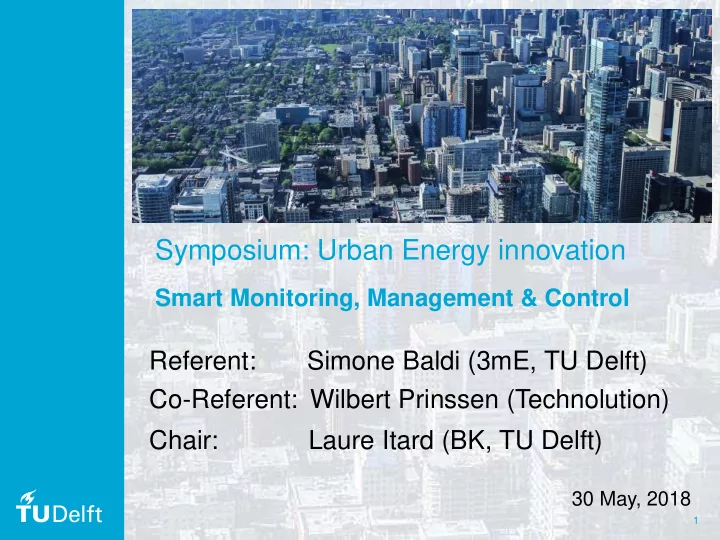

Symposium: Urban Energy innovation Smart Monitoring, Management & Control Referent: Simone Baldi (3mE, TU Delft) Co-Referent: Wilbert Prinssen (Technolution) Chair: Laure Itard (BK, TU Delft) 30 May, 2018 1
Contents 1. The integrated picture 2. Topics covered under the theme 3. What is digitization? 4. Exciting research challenges 5. Research activities @ TU Delft 6. Conclusion: key topics/priorities 2
1. The integrated picture 3
2. Topics covered under theme # 5 Smart Monitoring, Management & Control • Big data – From Internet of “too many” Things to Integration of Things • Self-learning Control – Adaptive and learning-based intelligence • Autonomous Demand response – Automated DR programs • Energy-aware communities – Social energy, consumer engagement • Socio-technical systems – Integrate humans in the loop, steer behavioural change 4
Theme #5 at TU Delft Architecture and the built environment Technology, Policy and Building Physics & Management Services Engineering Systems Building Energy and Services Epidemiology Multi-Actor Systems Industrial Design Engineering Cyber-Physical Electrical engineering, Systems Mathematics and Computer Internet of Things Science Electrical sustainable energy Mechanical, Maritime Software Technology and Materials Institute for Computational Delft Center for Science and Engineering Systems and Control 5
3. What is Digitization? • Zigbee, LoRaWAN, Z-Wave etc. • Internet of Things • Big data • Artificial intelligence 6
ZIGBEE Zigbee is the wireless language that everyday devices use to connect to one another. Network of physical devices, vehicles, home appliances and other items Embedded software, sensors, actuators, and connectivity which enables these objects to connect and exchange data . 7
Internet of Things When IoT is augmented with • sensors and • actuators, the technology becomes an instance of the more general class of cyber-physical systems , which also encompasses technologies such as smart grids, smart thermal grids virtual power plants, smart homes, intelligent transportation and smart cities. 8
Big data “Big data” refers to the use of predictive analytics, user behavior analytics, or other methods that extract value from data Energy sector investments in big data have ballooned by a factor of 10 last year: Smart meter maker Itron’s o acquisition of demand response provider Comverge in May 2017 for $100 million. o Utilities have spent nearly $3 billion on grid edge startups with sophisticated software and analytical capabilities. High energy performance hinges on the ability to gain insights from data - insights that enable organizations to make better decisions at the right time -> DECISION MAKING 9
Artificial intelligence The insight derived from data collected from new Internet-connected devices can be used to develop new services, enhance productivity and efficiency, improve real-time decision making, solve critical problems, create new and innovative experiences . However, as more devices connect, companies face increased fragmentation, interoperability, and security challenges. Internet of “too many” things! 10
4. Exciting research challenges • At least two aspects seems to appear – ENERGY EFFICIENCY: How to use data for better decisions (HVAC control, optimal renovations, integration of renewables or storage) – HUMAN-IN-THE-LOOP: How to integrate humans (engage consumers, citizen-centered solutions, …) Two main drives: a) How to make machines intelligent, self-learning and self-optimizing? b) How to make machines interact with humans (and vice versa)? 11
5. Research activities @ TU Delft OFFICE LAB (The Green Village) Testbed in which office related innovations can be researched. Application of new materials, testing new services, building automation concepts etc. 250 m 2 and accommodates a INNOVATION RIJSWIJK (Green Technologies maximum of 20-25 employees 3.0) Rijksvastgoedbedrijf (TheDutch Central Government Real Estate Agency) Test environment: Rijkswaterstaat office building in Rijswijk Show that an energy-neutral office is possible via Internet of Things (IoT) and smart controls. 12
5. Research activities @ TU Delft SOCIAL GLASS (Understanding Cities through Big Social Data) How to use the activities of users on social media in such a way to predict behaviors in districts or cities. Use of social platforms as a way to promote the energy transition (create LOCAL4GLOBAL and AMBI (EU funded energy awareness among citizens, nudge projects) eco-friendly behaviours, etc.) Building automation systems can reduce buildings’ energy consumption of up to 30%. “Intelligent " algorithms for monitoring and control are compelling. Advanced methods for building diagnostics and control, powered by intelligent adaptive and reconfigurable algorithms.. 13
6. Conclusions: key topics/priorities Urgent need for • "efficient energy systems, embedded with control technology to make the energy management self- learning and self- optimizing“ • "facilitating the participation of consumers in the energy transition through smart home appliances, smart grids, and smart cities" 14
Recommend
More recommend